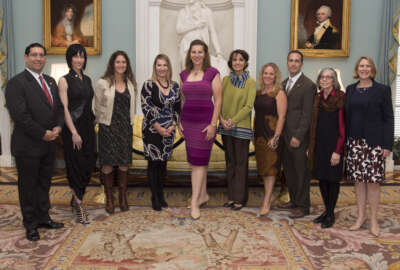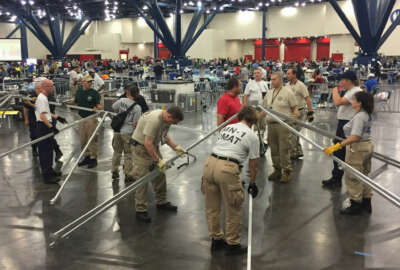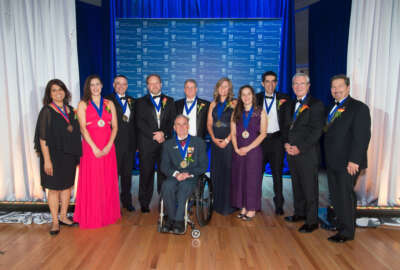
Foreign Service awards go to volunteers who ‘dream big, hope big, and inspire others’
Foreign Service officials say if you want to be an award winner, the key is to dream big, hope big, and inspire others.
Subscribe to Federal Drive’s daily audio interviews on iTunes or PodcastOne.
Craig Houston wanted to protect his newborn son. Grace Turner wanted to make sure she didn’t lose her nurse practitioner skills. Maritza Wilson just wanted to help.
While their motivations might stem from different sources, the benefit each of those people had on their communities was similarly powerful, and the reason why they are some of the 2017 winners of the Secretary of State Award for Outstanding Volunteerism Abroad (SOSA).
“Volunteer work is not a part of all cultures, and host countries’ nationals are often fascinated by the creativity and dedication of our community members who willingly contribute their time and energy,” said Deputy Assistant Secretary of State for Human Resources Constance Dierman. “Volunteer work constitutes a very effective form of personal and unofficial public diplomacy.”
Speaking earlier this month at the State Department headquarters in Washington, D.C., Associates of the American Foreign Service Worldwide President Joanna Athanasopoulos Owen, Ph.D, said the awards recognize “the most compelling volunteer efforts” made by Foreign Service employees and their family members.
More than 116 awards have been given out in the 27 years since the creation of the honor.
This year, 17 people were nominated, said Yolanda Macias-Cottrell, AAFSW SOSA chairwoman.
“The selection process was a difficult one because all of the nominees were impressive,” Macias-Cottrell said. “A key factor in selecting a winner is sustainability, and we believe the projects of this year’s awardees will continue over the long term reaching many local citizens and their communities.”
Sustainability is very important, but also hard to achieve in such a transient community, Athanasopoulos Owen explained. People start projects and then when their tour ends, they pack up, leave, and the project is dropped.
“What we’re trying to build now — and we have made a point out of it — is that we can connect people so that the next families that arrive can pick up on the same project and continue,” Athanasopoulos Owen said. “We think it’s very important to sustain it. Dream big, hope big, and inspire others to follow your steps, and manage to do some good volunteer work to advertise this essence of volunteerism that the American people have, which is rare compared to the rest of the countries.”
This year’s SOSA award winners are:
- Grace Turner, Dakar, Senegal (Bureau of African Affairs) — Turner joined the staff at House of Hope, a primary care clinic, helping with continuing education for the clinic’s nurses, and created a triage and treatment program for low-resource settings.
- Craig Houston, Chiang Mai, Thailand (Bureau of East Asian and Pacific Affairs) — Houston created a website to promote air quality during the country’s burning season.
- Alesia Krupenikava, Kyiv, Ukraine (Bureau of European and Eurasian Affairs) — Krupenikava helped recruit more than 150 girls to participate in the Technovation Challenge, a technology competition that encourages entrepreneurship for young women.
- Lisa Hess, Colombo, Sri Lanka (Bureau of South and Central Asian Affairs) — Hess partnered with the U.S. Navy and Sri Lankan sailors to promote dental hygiene for children. She also led community outreach including repairs to a local animal shelter and painting rooms at a school for the deaf and blind.
- Maritza Wilson, Managua, Nicaragua (Bureau of Western Hemisphere Affairs) — Wilson volunteered at a clinic where she helped with home and rural area visits. Wilson also led training on reproductive health for high school students.
Wilson was born and raised in Nicaragua, and has her medical license in the country. So when she ended up stationed with her husband in her home country, she knew it would be easy to find work and help people.
“I know the culture, I know the people and the language,” Wilson said. “There is always a need in every country we go to. I showed them I want to do this because I see the need and I want to help.”
It was a bit tougher to help in the case of Houston. The Scotsman said it was a bit tricky trying to get and share information from the Thai government about air quality during the burning season.
“There was some resistance to sharing data that people might not want to hear,” Houston said. “Obviously, tourism is big in Thailand. Our approach is really to just share the information as widely as possible and use that as a vehicle to broaden the conversation.”
The burning season starts in February and runs through May, Houston explained. Right now, he and his team are building out a network of air pollution sensors, with the hope of sharing their data on the website.
“This year the website will also be in Thai, so that will broaden the audience to the people that really matter there,” Houston said. “And also a number of schools have reached out to us and have been very supportive about mostly protecting their kids in school.”
When Turner got to her post in Senagal, she joined a charity clinic and found eager students in her own colleagues.
Turner helped spearhead a new pediatric program focused on children younger than five, and also led efforts to build up a triage and treatment program for patients in low-resources settings.
“There is no instrumentation, we don’t use a thermometer, we don’t use a stethoscope, we don’t use a blood pressure cuff, and I am working to create an evidence-based toolkit that we can then export to other clinics both in Senagal and outside Senagal,” Turner said. “The pediatric providers training and then this triage and treatment program are the two things that I’m most excited about simply because of their impact and sustainability.”
Three other awards were also given out during the ceremony. They were:
- The 2017 Tragen Award — Kelly Bembry Midura — Midura organized an online community where family members of Foreign Service workers could network and share information about local resources and activities. That effort expanded into a blog and “instruction manual” for family members when they move to a new post.
- The Champions of Career Enhancement for Eligible Family Members (CCE-EFM) —Judy Ikels — Ikels has served the State Department for 27 years. Her work includes division chief of the Office of Employee Relations, Community Liaison Office coordinator in Rio De Janeiro, and she was deputy director with the Family Liaison Office.
- The 2017 Dorman Award — Anna Dworken — Dworken is active in the State Department’s BookRoom and BookFair, which raises money for scholarships for Foreign Service family members. She joined the AAFSW board in 2008 and continues to serve on its finance Committee.
Dworken said she enjoys combing through the department’s collection of literature; she recently sold a signed Nelson Mandela book.
“I became involved first because I was assistant treasurer [for AAFSW], doing financial things, and the BookRoom manager retired,” Dworken said. “Somebody had to tackle doing the work and somehow I just fell into it and learned a lot. It turned out there was a room down in the depths of the State Department with 70, 80 boxes of books that were all once meant to go to auction and never did. That was my inspiration to begin working intensely on the old books.”
Midura said she was inspired to start an online network for Foreign Service members and their families after being stationed at several “hardship posts” in Latin America and Africa.
“There was very minimal infrastructure, no playgrounds, power outages for several hours every day, and I had small children,” Midura said.
She started collecting information about preschools and playgroups, and when she moved with her husband and family to Europe, she moved all of that information online. The problem, however, was that family members didn’t have direct access to the State Department’s intranet, where it would make the most sense to be able to connect to fellow Foreign Service families.
Instead, Midura used the internet to post resources for family members, and she expanded her role as a webmaster for AAFSW and helped with the organization’s online presence in the 1990s and 2000s.
Midura’s husband retired his fall, and the couple are still planning out their retirement. One thing for certain, however, is that Midura is turning over the reins to her projects.
“When we first joined the Foreign Service, I was one of the younger people and I got frustrated when older people were telling me how things should be done,” Midura said. “I feel like now it’s time for me to step out of the way and let other people roll with it. I’m very much looking forward to seeing in the next 10 years what happens with Foreign Service family members, because they are miles ahead of the State Department and capable of doing anything that they set their minds to.”
Copyright © 2024 Federal News Network. All rights reserved. This website is not intended for users located within the European Economic Area.





